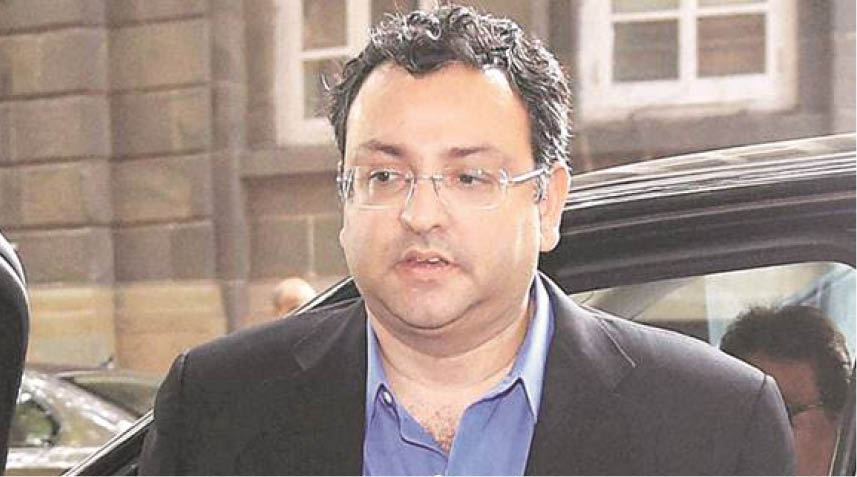On 18th December, 2019, in a major development in the Tata Sons-Cyrus Mistry case, the National Company Law Appellate Tribunal (NCLAT) ordered the restoration of Cyrus Mistry as Executive Chairman of Tata Group and has ruled N Chandrasekaran’s appointment as Executive Chairman as illegal. The Tribunal added that the order of restoration of Mistry would be operational after four weeks; this period will allow the Tata Group to file for an appeal against NCLAT’s latest decision.
“Today’s judgment isn’t a personal victory for me, it’s a victory for the principles of good governance and minority shareholder rights. The outcome of the appeal is a vindication of my stand,” quoted Cyrus Mistry, as per a statement by ANI.
Within minutes of the news break, shares of key Tata group companies – Tata Motors slipped 3.05% on the BSE, while that of Tata Consultancy Services (TCS) ended 0.07% higher while Tata Steel settled 1.16% higher.
Cyrus Mistry, scion of the wealthy Shapoorji Pallonji family that owns a minority stake in Tata Sons, has been locked in a legal feud with Tata Sons and Tata family patriarch, Ratan Tata, on his removal as Chairman in October, 2016. He accused the Tatas of mismanagement and oppression of minority shareholder interests. Tata denied the charges.
In January this year, ‘Cyrus Investments’, the investment firm of Shapoorji Pallonji (SP) Group, had contended to the tribunal that Cyrus Mistry was removed as the chairman of Tata Sons against the company’s Articles of Association (AoA). Cyrus Investments had also urged for the modification in Tata Sons’ AoA, particularly Article 75, which empowers it to ask minority shareholders to transfer their shares. The SP Group had also earlier requested the NCLAT to order amending Article 121 of the Tata Group’s Articles of Association, alleging that the article was helping Dorabji Tata Trust and Ratan Tata Trust, part of the Tata Trust, to govern the whole Group even as they are the minority shareholders.
The Mumbai bench of the National Company Law Tribunal (NCLT) had dismissed the petitions filed by the two investment firms Cyrus Investments Pvt Ltd and Sterling Investments Corp challenging Mistry’ removal. Later, Mistry had also personally approached the NCLAT over the NCLT order.
The history: Cyrus Mistry, son of Pallonji Mistry, owner of the Shapoorji Pallonji group and the biggest stakeholder in the Tata Group, was appointed to the top position in 2012. Mistry effected several changes in the business practices due to which capital expenditure increased but returns to shareholders decreased. He replaced the trusted hands of Ratan Tata and his proposed sale of Tata Steel port plant in the UK was seen as harming the goodwill earned by Tata abroad. The extended dispute with the Docomo group proved to be one of the nails in the coffin. Tata had to cough up $1.2 billion in the arbitration to the Japanese group.
A Civil Engineer from London’s prestigious Imperial College, Mistry was involved in the family’s flagship construction business before he left it to join the Tatas. He learnt the business ropes at Tata Industries, Tata Steel, Tata Chemicals and Tata Motors. And his hard work paid off as he rose to be the director of several other companies like Forbes Gokak, United Motors (India) and Shapoorji Pallonji and Co.
Cyrus Mistry, whose family owns 18.4% stake in Tata Sons, had challenged his removal in the National Company Law Tribunal (NCLT). The case of oppression and mismanagement against Tata Sons and 20 others, including Ratan Tata, filed by Mistry family entities – Cyrus Investments and Sterling Investments – were however in March 2017 dismissed by the NCLT ruling that they were not eligible to pursue the allegations.
Section 244 of the Companies Act, 2013 allows a shareholder of a company to bring an oppression and mismanagement case against the firm if it holds not less than one-tenth of the issued share capital. On appeal, the Cyrus Mistry firms had secured a partial win at the NCLAT, which waived the 10% shareholding requirement but remitted the matter to the NCLT.
In July 2018, the NCLT rejected Mistry’s petition to reinstate him and found no merit in his allegations of operational mismanagement and oppression of minority shareholders. Mistry had approached the appellate tribunal against the verdict of Mumbai NCLT. The NCLAT had reserved its judgment after completion of arguments from both sides in July this year. The judgment was pronounced by a two-judge bench headed by Justice S J Mukhopadhyay, this week, on 18th December, 2019.
- જેજે હોસ્પિટલના પારસી વોર્ડમાં નવરોઝની ઉજવણી - 5 April2025
- ઝોરોસ્ટ્રિયન વિમેન્સ એસોસિએશન ઓફ સુરત દ્વારા પાણી બચાવો પર્ફોર્મન્સ - 5 April2025
- આવાં યઝદના પરબની ઉજવણી - 5 April2025
